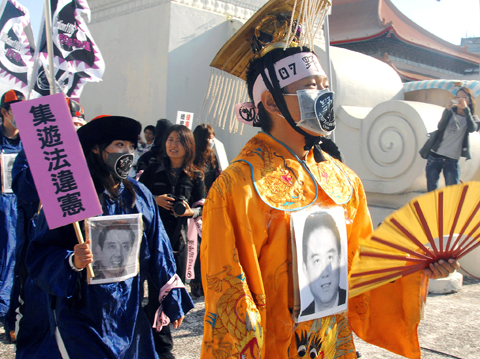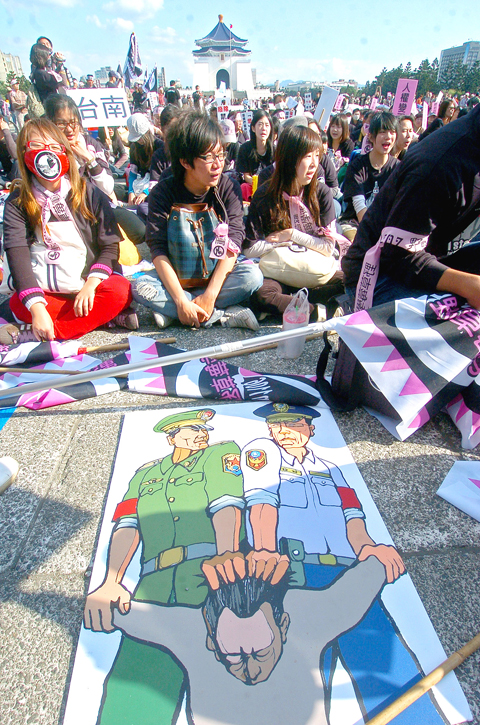The Wild Strawberry Student Movement marked its one-month anniversary in Taipei yesterday with a rally featuring a mock funeral for the nation’s human rights, attracting several thousand participants of all ages.
The demonstrators, who only reported their planned event to the police instead of seeking approval from law enforcement authorities as required by the Assembly and Parade Law (集會遊行法), peacefully marched to the Legislative Yuan, the Control Yuan, the Executive Yuan, the National Police Agency (NPA) and Ketagalan Boulevard in front of the Presidential Office.
The 2.7km march began at 2pm, with student protesters from around Taiwan and a number of non-governmental organization members dressed in black marching down Zhongshan S Road with a banner that read “peaceful, rational and maintaining order [even though we only] reported [the rally].”

PHOTO: AFP
An estimated 4,000 people joined the protest, event organizers said. Students wore Qing dynasty emperor’s and officials’ costumes with pictures of President Ma Ying-jeou (馬英九), Premier Liu Chao-shiuan (劉兆玄), NPA Director-General Wang Cho-chiun (王卓鈞) and National Security Bureau Director-General Tsai Chao-ming (蔡朝明).
A couple brought their son and daughter to the parade, carrying a symbolic reaping-hook and dragging several dolls colored in red on the ground, a move they said symbolized the death of the nation’s human rights.
As the rally participants proceeded with their demonstration, they were stopped by a small number of police officers near National Taiwan Democracy Memorial Hall, the legislature and Ketagalan Boulevard, but the police officers only issued warnings and did not block them.

PHOTO: WANG MIN-WEI, TAIPEI TIMES
The officers left the scene as rally participants and supporters applauded the officers for carrying out their police duty instead of clashing with them.
The event was highlighted with a mock funeral for human rights in the middle of the boulevard — about 250m away from the Presidential Office — with four students dressed in black suits carrying a coffin symbolizing human rights and covering it with a national flag, as the event organizers played the national anthem in the background.
The protesters returned to Liberty Square at the hall after the “funeral.” No conflicts took place throughout the rally.
The students had staged nationwide silent sit-ins since Nov. 6 to protest what they called excessive police force during a visit by Chinese envoy Chen Yunlin (陳雲林) early last month.
The students have called for an immediate amendment to the assembly law and for Ma and Liu to apologize and Wang and Tsai to resign.
The Executive Yuan on Thursday responded to the students’ appeals by approving a proposed amendment to the assembly law that scrapped the police’s authority to approve or disapprove a rally application.
Many of the student protesters questioned the government’s sincerity in amending the law, saying that there was nothing different between the proposed amendment and the current law because organizers would still be required to register their activities five days in advance.
The students criticized the government’s proposal for three situations in which police would be empowered to inform organizers within 36 hours of registration that their plans were not acceptable.
The three situations were: if the event would jeopardize national security, social order or the public interest; if it would endanger lives, freedom or property; or when an event taking place close to another could cause problems.
Hsu Jen-shou (??, director of yesterday’s rally, said the government did not intend to account for or take responsibility for the authority police allegedly abused during Chen’s visit.
“The Wild Strawberries strongly demand that the governing [Chinese Nationalist Party (KMT)] party immediately promise within three days that the power abuse and violations of freedom of speech during Chen’s stay in Taiwan will never happen again,” he said.
Although the Wild Strawberries is a student movement, the parade yesterday attracted non-students as well.
“We have to speak out,” a 63-year-old woman surnamed Chen (陳) said. “Because we’re suffering setbacks in human rights, we’re being betrayed by our own government.”
Chen’s husband and daughter, who accompanied her, nodded in agreement.
Wang Hao-han (王顥翰), a 23-year-old student at Soochow University’s Center for Study of Human Rights, said he was upset with the Assembly and Parade Law revision proposed by the Executive Yuan.
“I’m not sure if I should call it an ‘improved version’ [as the government claims], because the new version is more strict than the current one,” he said. “Right now, an unapproved demonstration could only be considered illegal after the police issue three warnings, but in the new version, you’re in trouble already if you didn’t notify the police in advance.”
The concern of National Chiaotung University student surnamed Liu (劉) perhaps explains why many demonstrators declined to reveal their full names during interviews.
“We’ve observed a rapid deterioration of human rights in the country — who knows what would happen to me if my name got published in a newspaper?” he said. “So a lot of us would rather keep a low-profile.”
Many foreigners in Taiwan were spotted at the demonstration.
Most civic groups were happy to see the number of people on the street.
“We organized various events on human rights in the past month and now we’re very tired,” Taiwan Association for Human Rights secretary-general Tsai Chi-hsun (蔡季勳) said yesterday. “It’s good to see so many people are still concerned about the issue, and remain peaceful the whole time.”

The CIA has a message for Chinese government officials worried about their place in Chinese President Xi Jinping’s (習近平) government: Come work with us. The agency released two Mandarin-language videos on social media on Thursday inviting disgruntled officials to contact the CIA. The recruitment videos posted on YouTube and X racked up more than 5 million views combined in their first day. The outreach comes as CIA Director John Ratcliffe has vowed to boost the agency’s use of intelligence from human sources and its focus on China, which has recently targeted US officials with its own espionage operations. The videos are “aimed at

STEADFAST FRIEND: The bills encourage increased Taiwan-US engagement and address China’s distortion of UN Resolution 2758 to isolate Taiwan internationally The Presidential Office yesterday thanked the US House of Representatives for unanimously passing two Taiwan-related bills highlighting its solid support for Taiwan’s democracy and global participation, and for deepening bilateral relations. One of the bills, the Taiwan Assurance Implementation Act, requires the US Department of State to periodically review its guidelines for engagement with Taiwan, and report to the US Congress on the guidelines and plans to lift self-imposed limitations on US-Taiwan engagement. The other bill is the Taiwan International Solidarity Act, which clarifies that UN Resolution 2758 does not address the issue of the representation of Taiwan or its people in

US Indo-Pacific Commander Admiral Samuel Paparo on Friday expressed concern over the rate at which China is diversifying its military exercises, the Financial Times (FT) reported on Saturday. “The rates of change on the depth and breadth of their exercises is the one non-linear effect that I’ve seen in the last year that wakes me up at night or keeps me up at night,” Paparo was quoted by FT as saying while attending the annual Sedona Forum at the McCain Institute in Arizona. Paparo also expressed concern over the speed with which China was expanding its military. While the US

SHIFT: Taiwan’s better-than-expected first-quarter GDP and signs of weakness in the US have driven global capital back to emerging markets, the central bank head said The central bank yesterday blamed market speculation for the steep rise in the local currency, and urged exporters and financial institutions to stay calm and stop panic sell-offs to avoid hurting their own profitability. The nation’s top monetary policymaker said that it would step in, if necessary, to maintain order and stability in the foreign exchange market. The remarks came as the NT dollar yesterday closed up NT$0.919 to NT$30.145 against the US dollar in Taipei trading, after rising as high as NT$29.59 in intraday trading. The local currency has surged 5.85 percent against the greenback over the past two sessions, central